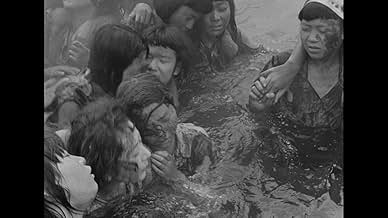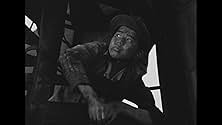Ajouter une intrigue dans votre langueBrilliant and extremely realistic retelling of the day in Hiroshima that the bomb dropped and following days.Brilliant and extremely realistic retelling of the day in Hiroshima that the bomb dropped and following days.Brilliant and extremely realistic retelling of the day in Hiroshima that the bomb dropped and following days.
- Réalisation
- Scénario
- Casting principal
Avis à la une
relatively crudely staged but reflecting reality, even this film can't recreate the horror and suffering of the surviving residents in the aftermath of the bombing--but it tries with honesty.
a historical experience. their tale.
like a recounting of the holocaust by survivors.
I'm not sure the Teacher's Union got what they wanted out of this movie; the trouble with directors is they go off and make the movie they want instead of the one you want. In any case, some of the sequences looked like modern 'slow zombie' movies, except they seemed much more real and terrifying. The union did not make a third movie. Perhaps they ran out of money.
But I think so long as people are aware that Japanese films also cover the effects of the atomic bomb while focusing on its victims, then that entirely negates the need for an American or English filmmaker to cover such a perspective. Unfortunately, not many people do seem to know about 1953's Hiroshima, as it only has about 1100 views on Letterboxd and about half of that on IMDb. It should be more well-known, though, because it's an impressively made and remarkably realistic depiction of the 1945 bombing of Hiroshima, including the aftermath and how the city grappled with the devastation following the end of World War II.
The film's commendable for how grounded and intensely real it all feels. The production value is, for the most part, incredible, with the scenes set right after the bombing feeling truly authentic and harrowing. It's a very tough film to sit through, but I think much of it will stick with me, and I don't feel like there are a ton of movies 70+ years old that feel quite this visceral.
I think the final act gets a little unfocused, if I was to have a complaint. I thought it all was losing me a bit towards the end, but then the final scene comes around and ties just about everything together in a haunting and effective way. It's not a film I think I'll ever rewatch, but I'm glad I've seen it now, because there's a ton to appreciate within this very hard-hitting historical drama.
Hiroshima, the movie, is based on a book called Children Of Atomic Bomb, which is a collection of stories by child survivors of the attack. Ninety thousand Hiroshima residents, many of them hibakusha (a term referring to the survivors of the atomic bombings of Hiroshima and Nagasaki), labour unions and a head of university volunteered to help the pro-peace and pacifist movie to be made as no commercial entity and studio would help or touch it. The Japanese teachers' Union financed the film to promote peace. The film is now restored as best as possible following its rediscovery. It depicts the period during World War II prior to and during the atomic bombing and the physical and societal aftermath
The focus of the film is the children, in particular students from a school, one of whom we learn right away has something typical of the post-war period namely leukemia which she, her fellow students and teachers call 'atomic bomb illness.' She confesses to her friends that she doesn't want to die. The students are studious, but also in varying forms of denial, shock and ignorance. They read of the American hypocrisy of howling when Germany uses poison gas, but then itself drops atomic bombs on Japanese cities. Today's Japanese know little about the dates and details of the atomic bombs over their country, but ironically even the children of the 1950s had little factual information about what had happened. Indeed the contemporary conservative Japanese government of 2017 voted against the abolition of nuclear weapons at the United Nations. Back to the children and during the war they knew American 'B' bombers by sight and sound, yet and obviously no one expected the atomic bomb given how the technology was new and never used prior. The aftermath was unbelievable. After thinking for some time the best description of the depiction in the film is none other than 'hell.' What the viewer sees is hell. Man and woman, old and young, civilian and military are in an actual hell and no grainy sixty-year-old footage can distort, diminish or mask it. The film demonstrates the hell other films try to portray: dark, smoky, grim; devastation, rubble, piles of forlorn bodies suffering or dead everywhere with no respite or safety as black rain pours from the sky on the charred and burnt bodies and the living alike. The children are young, but injured or dying at worst and orphaned, sick, suffering, in gangs and separated from family and alone at best. In contrast, we see shots of Japanese harlots hand-in-hand with American soldiers after the war walking around in dresses or sitting and dancing with them at dance clubs. A student succumbs to cancer following her blood poisoning due to radiation in a barebones hospital. It is depressing beyond belief. The film is even-handed - if one could call anything the flip side of civilians incinerating as an atomic bomb drops from the sky fair - and the audience sees Japanese working and mobilizing during the war, practicing and child labour in the name of emperor. The Japanese army dishes out propaganda continuously and even once the atomic bomb is dropped a general is seen demanding a civilian salute him. Yet, no soldier helps the civilian rescue his trapped wife. Then the Japanese officers are seen sitting around plotting to further lie to the citizens and discussing the best way to kill the "rumours" as opposed to helping the citizens or confronting the reality on the ground.
As the world turns some things never change. Both the American war criminals and the Japanese elites - like the emperor - are in another world comfortable with full stomachs and never missing a meal as hell unfolded.
Le saviez-vous
- AnecdotesMore than 100,000 people acted as extras without pay in the making of the film, most of whom were Hiroshima locals, and many of whom had lost friends or family in, or had even personally survived, the bombing.
- Citations
Narrator: For a moment, the navigator forgot he was in a war and gave himself over to his thoughts. He suddenly remembered what was about to happen to the people of Hiroshima. His mission was bringing doom to those people. The "gadget" in the belly of his plane was a weapon far beyond imagination. It was an atomic bomb. The 20th Century had seen the advent of a bomb powerful enough to kill every human being within a kilometer of its blast center. Worse still, the radioactivity from the bomb would do incalculable damage to all living creatures in the vicinity. Hiroshima would instantly become a city of corpses. That thought led Van Krik to a feeling of utter emptiness. Overwhelmed by sadness, desperate for something to cling to, he suddenly recalled his mother's face.
- Versions alternativesThere is an Italian edition of this film on DVD, distributed by DNA Srl: "HIROSHIMA (1953) + LE CAMPANE DI NAGASAKI (1950)" (2 Films on a single DVD), re-edited with the contribution of film historian Riccardo Cusin. This version is also available for streaming on some platforms.
- ConnexionsFeatured in Hiroshima mon amour (1959)
Meilleurs choix
- How long is Hiroshima?Alimenté par Alexa
Détails
Box-office
- Budget
- 240 000 $US (estimé)
- Durée1 heure 44 minutes
- Couleur
- Mixage
- Rapport de forme
- 1.37 : 1
























